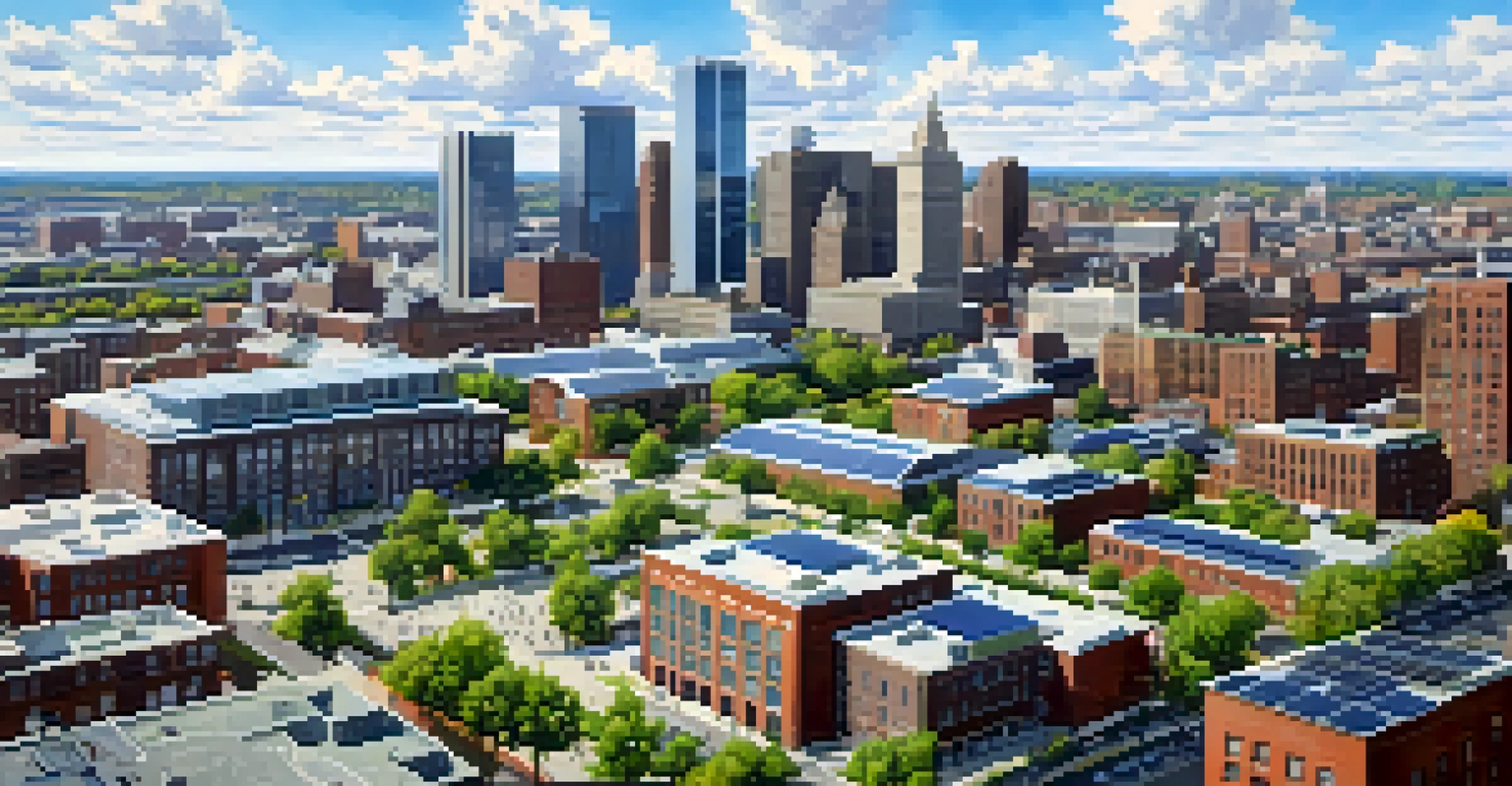Sustainability Initiatives: Newark's Economic Future

Understanding Sustainability in Newark's Context
Sustainability refers to meeting our needs without compromising future generations' ability to meet theirs. In Newark, this concept is gaining traction as the city seeks to balance economic growth with environmental health. It's not just about going green; it's about creating a resilient economy that benefits everyone in the community.
Sustainability is not just about doing less harm. It's about doing more good.
Newark's initiatives often focus on reducing waste, conserving energy, and promoting local resources. For example, by investing in green infrastructure, the city aims to improve its air and water quality while also enhancing public spaces. This dual focus on environment and economy positions Newark as a leader in sustainable urban development.
The importance of sustainability is underscored by its potential to create jobs and stimulate local businesses. As Newark embraces these initiatives, it opens doors for innovation and attracts companies that prioritize sustainable practices, thereby contributing to a vibrant local economy.
Key Sustainability Projects Shaping Newark's Future
Newark is home to several key projects aimed at sustainability, such as the Newark Energy Aggregation Program. This initiative allows residents to purchase energy from 100% renewable sources, reducing both their carbon footprint and energy costs. Such programs not only empower citizens but also demonstrate the city's commitment to a greener future.

Moreover, the city has also implemented urban forestry projects, enhancing green spaces while improving air quality. These tree planting efforts not only beautify the city but also provide essential shade, making urban areas more livable. It's a classic example of how small changes can lead to significant environmental benefits.
Newark's Green Future Initiatives
Newark is implementing various sustainability projects aimed at reducing environmental impact while promoting economic growth.
Another noteworthy initiative is the promotion of sustainable transportation options. By improving public transit and encouraging biking, Newark is working to reduce traffic congestion and emissions. This shift not only supports environmental goals but also enhances the quality of life for its residents.
The Role of Local Businesses in Sustainability
Local businesses play a crucial role in Newark’s sustainability initiatives. Many entrepreneurs are embracing eco-friendly practices, whether it's sourcing materials locally or reducing waste in their operations. This shift not only helps the environment but also appeals to a growing consumer base that values sustainability.
The greatest threat to our planet is the belief that someone else will save it.
For instance, some restaurants in Newark are focusing on farm-to-table practices, sourcing ingredients from local farms. This not only reduces the carbon footprint associated with transportation but also supports the local economy. It’s a win-win situation that fosters community relationships and enhances food quality.
Additionally, businesses that adopt sustainable practices often see benefits such as reduced costs and increased customer loyalty. As consumers become more conscious of their choices, companies that prioritize sustainability can differentiate themselves in a competitive market.
Community Engagement in Sustainability Efforts
Engaging the community is vital for the success of sustainability initiatives in Newark. Local organizations, schools, and residents are coming together to educate one another about sustainable practices. This grassroots approach fosters a sense of ownership and responsibility among community members.
Programs such as community clean-up events and tree planting days not only improve the environment but also strengthen community bonds. When residents actively participate, they cultivate a culture of care for their surroundings. This collective effort can lead to long-term changes in behavior and attitudes toward sustainability.
Community's Role in Sustainability
Engaging local residents in sustainability efforts fosters a sense of ownership and responsibility, leading to long-term positive changes.
Moreover, educational workshops and initiatives are being organized to inform residents about recycling and energy conservation. By equipping the community with knowledge, Newark is empowering its citizens to take meaningful action toward a sustainable future.
Leveraging Technology for Sustainable Growth
Technology plays a pivotal role in advancing Newark’s sustainability initiatives. Smart city technologies, such as energy-efficient lighting and waste management systems, are being implemented to optimize resource use. These innovations help the city reduce its ecological footprint while also improving operational efficiency.
For example, sensors that monitor air quality can provide real-time data, allowing city officials to respond quickly to pollution spikes. This proactive approach not only protects public health but also demonstrates a commitment to transparency and accountability. It’s an invitation for residents to engage in their city’s sustainability journey.
Additionally, Newark is exploring renewable energy technologies, such as solar panels on public buildings. By investing in these advancements, the city not only reduces its reliance on fossil fuels but also sets a precedent for businesses and residents to follow suit.
Policy Support for Sustainable Development
Effective policy is essential for the success of Newark's sustainability initiatives. The local government is committed to implementing regulations that promote green practices and support sustainable development. This includes zoning laws that encourage eco-friendly building designs and incentives for businesses that adopt sustainable practices.
Moreover, Newark's participation in regional sustainability initiatives highlights its dedication to collaborative efforts. By aligning with neighboring cities, Newark can tackle larger environmental issues and share best practices. This collaborative approach amplifies the impact of local actions on a broader scale.
Economic Growth Through Sustainability
Sustainability initiatives in Newark not only protect the environment but also create jobs and stimulate local economic development.
In addition, public funding and grants for sustainability projects are becoming more accessible. These financial resources enable the city to invest in initiatives that might otherwise be out of reach, ensuring that sustainability remains a priority for Newark’s economic development.
The Economic Benefits of Sustainability Initiatives
Sustainability initiatives in Newark are not just about protecting the environment—they're also a catalyst for economic growth. By creating green jobs in sectors like renewable energy and sustainable construction, these initiatives stimulate local economies. This focus on green employment can help reduce unemployment while fostering a skilled workforce.
Furthermore, attracting businesses that prioritize sustainability can enhance Newark's economic profile. Companies that focus on eco-friendly practices are often seen as more innovative, appealing to investors and customers alike. This shift in perception can lead to increased investment and economic development opportunities.

Lastly, the long-term cost savings associated with sustainability cannot be overlooked. Reduced energy consumption and waste lead to lower operational costs for both the city and its residents. When funds are saved, they can be redirected toward community development and other vital services, creating a sustainable cycle of growth.